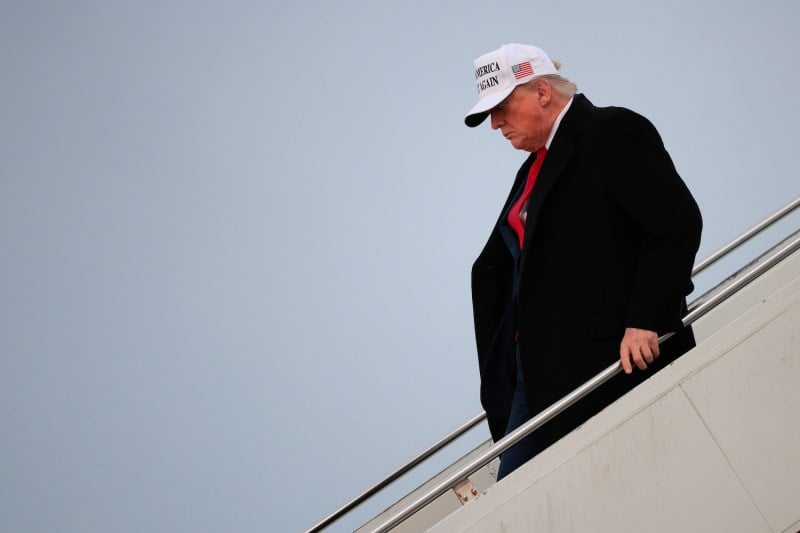Trump’s Half-hearted G-7 Left Few Accomplishments and Plenty of Disagreements

Trump’s Half-hearted G-7 Left Few Accomplishments and Plenty of Disagreements
The early U.S. departure leaves few big wins for the group or for Washington.
U.S. President Donald Trump arrives at Calgary International Airport for the G-7 leaders’ summit, in Calgary, Alberta, on June 15. Chip Somodevilla/Getty Images
U.S. President Donald Trump’s abbreviated and disinterested visit to the G-7 summit in Canada helped advance none of the group’s goals, especially in dealing with trade wars and real wars.
Trump left the summit late on Monday, saying he was heading back to Washington early to deal with the escalating conflict between Israel and Iran. That left the rest of the meeting, which continued Tuesday, as a rump G-6 with perhaps more comity but less ability to coordinate meaningful action on everything from tougher sanctions on Russia to a joint stance on the Israel-Iran conflict.
U.S. President Donald Trump’s abbreviated and disinterested visit to the G-7 summit in Canada helped advance none of the group’s goals, especially in dealing with trade wars and real wars.
Trump left the summit late on Monday, saying he was heading back to Washington early to deal with the escalating conflict between Israel and Iran. That left the rest of the meeting, which continued Tuesday, as a rump G-6 with perhaps more comity but less ability to coordinate meaningful action on everything from tougher sanctions on Russia to a joint stance on the Israel-Iran conflict.
Trump’s discomfort with meetings of big democracies was made patent when he suggested, again, that Russia should be readmitted to the group, which it was kicked out of after it invaded Ukraine the first time, in 2014. Trump also broached the idea of China joining the club.
“I think there were low expectations of what was going to be achieved at this meeting,” said Rachel Ziemba, an adjunct senior fellow at the Center for a New American Security.
What Trump didn’t help with: a tough joint statement from the group on the Israel-Iran fight or progress on efforts to intensify economic pressure on Russia.
Initially, Trump distanced himself from a draft statement, and eventually signed on to a watered-down statement that affirmed Israel’s right to self-defense and insisted Iran could not have nuclear weapons, but fell short of calling for a cease-fire in a conflict that is entering day five with no apparent end in sight.
Just as problematic, for the European Union, EU member states, and the United Kingdom, as well as Ukrainian President Volodymyr Zelensky, a guest at the summit, was Trump’s refusal to consider additional economic sanctions on Russia. Trump defended his reluctance by saying that U.S. sanctions on countries such as Russia cost the United States “billions and billions” of dollars.
The EU, the U.K., and Germany had all stressed that additional sanctions, particularly a tighter limit on legal Russian oil sales, are needed to force Russia back to the negotiating table. Zelensky’s whole mission in Alberta was to press Trump to support greater sanctions pressure, but Trump left the summit and avoided his scheduled Tuesday meeting with the Ukrainian president.
“I think Trump has little interest in increasing pressure on Russia,” Ziemba said.
The European Union last week proposed a preliminary new sanctions package that included a lower cap of $45 per barrel on legal Russian oil sales, down from $60 currently. That measure would crimp Russia’s energy earnings without seriously upsetting the oil market, but the EU hoped to have U.S. support to implement the measure.
The EU and U.K. have mulled trying to lower the price cap without U.S. support, but that would likely be less effective and would almost certainly drive an increase in hard-to-police illegal Russian “shadow fleet” tankers that ship Russian crude outside of legal channels.
“On Russia, it keeps us on this track toward divergence. The U.K. and the EU may go it alone, but there are some real enforcement challenges,” Ziemba said.
British Prime Minister Keir Starmer unveiled a fresh slate of U.K. sanctions on Russia at the summit on Tuesday, including measures to curb Russian energy earnings and further target the shadow fleet, and vowed to try to implement the lower oil-price cap even without Washington’s support.
Trump’s list of non-accomplishments at the summit also include a lack of progress on the most pressing trade disputes. Despite a meeting with European Commission President Ursula von der Leyen, Trump said the two sides had made no progress toward a trade truce, with the deadline for the return of steeply higher U.S. tariffs just three weeks away.
Trump also failed to make any progress in trade talks with Japan, another major U.S. trade partner. Any hopes of trade rapprochement with Mexico, a guest at the summit, were scotched when Trump departed ahead of his scheduled Tuesday meeting with Mexican President Claudia Sheinbaum.
What Trump did achieve in Alberta was the rollout of a miniature program of partial tariff relief for a handful of British industries (though not steel) including autos, auto parts, and aerospace. The framework agreement Trump and Starmer brandished on Monday in Canada is not a trade deal, but it is the closest to an agreement that Trump has reached during his self-imposed 90-day sprint to do “trade deals” with more than half the countries on Earth.
Trump’s curtailed visit to the G-7 left the summit to finish its work as a smaller group without its most powerful member. Given Trump’s disinclination to work in multilateral formats and ongoing divergences with most U.S. allies and partners, it’s possible, but not a given, that the G-7 will slide further into irrelevance for the rest of his term.
“It’s too early to say if the G-7 is useless for now,” Ziemba said. “They avoided a public blowout, but the net result is a group that is less able to come to consensus on things, or move to action on admittedly complicated issues.”
Keith Johnson is a reporter at Foreign Policy covering geoeconomics and energy. Bluesky: @kfj-fp.bsky.social X: @KFJ_FP
Stories Readers Liked
Iran-Israel Conflict
Analysis and reporting

How the Israel-Iran War Might End
Scenarios include an Iranian defeat, an Israeli retreat—or an expanded regional conflict.





















Join the Conversation
Commenting is a benefit of a Foreign Policy subscription.
Subscribe
Subscribe
Already a subscriber?
.
View Comments
Join the Conversation
Join the conversation on this and other recent Foreign Policy articles when you subscribe now.
Subscribe
Subscribe
Not your account?
View Comments
Join the Conversation
Please follow our comment guidelines, stay on topic, and be civil, courteous, and respectful of others’ beliefs.
View Comments
Change your username |
Log out
Change your username:
CANCEL
Confirm your username to get started.
The default username below has been generated using the first name and last initial on your FP subscriber account. Usernames may be updated at any time and must not contain inappropriate or offensive language.